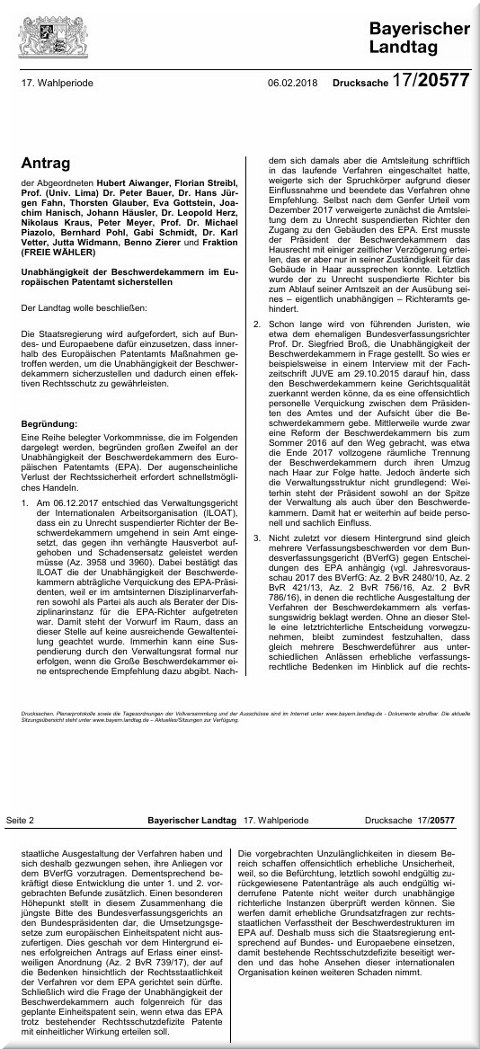

A preliminary discussion is scheduled to take place at the next sitting of the EU Affairs Committee of the Bavarian State Parliament at 12:30 on Tuesday 20 February 2018.
Bavarian State Parliament
17th Parliamentary Term 06.02.2018 Printed matter 17/20577
Motion
Dr. Hubert Aiwanger, Florian Streibl, Prof. (Univ. Lima) Dr. Peter Bauer, Dr. Hans Jürgen Fahn, Thorsten Glauber, Eva Gottstein, Joachim Hanisch, Johann Häusler, Dr.. Leopold Herz, Nikolaus Kraus, Peter Meyer, Prof. Dr. Michael Piazolo, Bernhard Pohl, Gabi Schmidt, Dr. Karl Vetter, Jutta Widmann, Benno Zierer and parliamentary group (FREIE WÃâHLER)
Safeguard the independence of the Boards of Appeal at the European Patent Office
The State Parliament wishes to adopt the following resolution:
The State Government [of Bavaria] is called upon to advocate at federal and European level the adoption of measures within the European Patent Office to safeguard the independence of the Boards of Appeal and thus to ensure effective legal protection.
Explanatory statement:
A number of documented incidents, as set out below, raise serious doubts about the independence of the Boards of Appeal of the European Patent Office (EPO). The apparent loss of legal certainty requires action as soon as possible.
1. On 6 December 2017, the Administrative Tribunal of the International Labour Organisation (ILOAT) ruled that a judge of the Boards of Appeal who had been unlawfully suspended was to be immediately reinstated in his official position, that the house ban imposed on him was to be lifted and that compensation for damages was to be paid (Judgments Nos. 3958 and 3960). In doing so, the ILOAT confirmed that the involvement of the EPO President was detrimental to the independence of the Boards of Appeal, because he had acted as both party and advisor to the Disciplinary Body for the EPO judges in internal disciplinary proceedings. This gives rise to the criticism that insufficient attention was paid to the separation of powers in this regard. After all a suspension by the Administrative Council can only be formally take place if the Enlarged Board of Appeal makes a proposal to that effect. At the time in question, however, after the Office Administration had made a written intervention in the ongoing proceedings, the judicial body refused to do so due to this interference and terminated the proceedings without a proposal. Even after the Geneva judgement of December 2017, the Administration initially refused the unlawfully suspended judge access to the EPO premises. Only after some delay did the President of the Boards of Appeal grant the right of entry but his competence was limited to announcing this for the premises in Haar. Ultimately, the unjustly suspended judge was prevented from exercising his - intrinsically independent - judicial position until the end of his term of office.
2. Leading lawyers, such as the former Federal Constitutional Court judge Prof. Dr. Siegfried Broß, have long questioned the independence of the Boards of Appeal. For example, in an interview with the specialist journal JUVE on 29 October 2015, he pointed out that the Boards of Appeal could not be recognised as having the character of a court of law quality, given that there was an obvious overlap in terms of staffing between the President of the Office and the supervision of the Boards of Appeal. In the meantime, a reform of the Boards of Appeal was initiated by the summer of 2016 which resulted in the spatial separation of the Boards of Appeal by moving to Haar at the end of 2017. However, there was no fundamental change to the administrative structure: the President remains the head of both the administration and the Boards of Appeal. In this way, he continues to have influence both in terms of staffing and resources.
3. At least partly due to this background, there are a number of constitutional complaints against decisions of the EPO pending before the Federal Constitutional Court (BVerfG) in which the legal structure of the proceedings before the Boards of Appeal is alleged to be unconstitutional (see the BVerfG's Annual Preview 2017): Az. 2 BvR 2480/10, Az. 2 BvR 421/13, Az. 2 BvR 756/16, Az. 2 BvR 786/16). Without trying to anticipate a final court decision at this juncture, it at least deserves to be noted that, for diverse reasons, several complainants have had serious reservations from a constitutional perspective about the rule-of-law conformity of the proceedings and have thus felt compelled to submit their concerns to the Federal Constitutional Court. Accordingly, this development provides additional confirmation of the findings set forth under 1 and 2. A particular highlight in this regard is the recent request by the Federal Constitutional Court to the German President not to sign off the implementing laws for the European Unitary Patent. This occurred against the background of a successful application for a temporary injunction (Case No. 2 BvR 739/17), which is likely to raise concerns about the rule of law in proceedings before the EPO. Finally, the question of the independence of the Boards of Appeal will also have a significant impact on the proposed Unitary Patent should the EPO be entrusted with the issuing of patents with unitary effect despite the existing deficiencies in the system of legal protection.
The aforementioned shortcomings in this area clearly create considerable uncertainty because, it is feared that both definitively rejected patent applications and finally revoked patents can no longer be examined by independent judges. Hence, important fundamental questions arise about the constitutional conformity of the appeal structures in the EPO. This is why the state government must take appropriate action at federal and European level so that the existing deficiencies in the system of legal protection are redressed and the prestige of this international organisation is not subject to further damage.